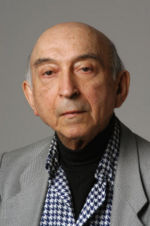扎德
出自 MBA智库百科(https://wiki.mbalib.com/)
拉特飞‧扎德(Lotfi A. Zadeh)——模糊理论之父目录 |
拉特飞‧扎德(Lotfi A. Zadeh,1921~ )美国自动控制专家,美国工程科学院院士。1921年2月生于苏联巴库。 1949年获哥伦比亚大学电机工程博士。现任伯克利加利福尼亚大学电机工程与计算机科学系教授。因发展模糊集理论的先驱性工作而获电气与电子工程师学会(IEEE)的教育勋章。
扎德在控制理论方面有重要贡献。
- 1949年他在关于时变网络频率分析的博士论文中引入的时变变换函数的概念,后来成为线性时变系统分析的工具。
- 1953年他给出一种设计非线性滤波器的新的逼近方法。
- 1963年他和 C.A.德舍尔合著的《线性系统的状态空间理论》是该领域的经典著作。书中介绍的状态空间逼近已成为最优控制中的标准工具,广泛用于工业机器人和社会经济系统。
- 1965年,扎德在《信息与控制》杂志第8期上发表《模糊集》的论文,引起了各国数学家和自动控制专家们的注意。他通过引进模糊集(边界不明显的类)提供了一种分析复杂系统的新方法。他提出用语言变量代替数值变量来描述系统的行为,使人们找到了一种处理不确定性的方法,并给出一种较好的人类推理模式。20年来他所开创的模糊集领域得到了迅速发展。
Lotfi A. Zadeh (b. 4 February 1921 in Baku, Azerbaijan) was educated in Iran and USA, having degrees from Tehran University, MIT, and Columbia University. Since 1959, Dr. Zadeh has been and currently is a member of the faculty of the Computer Science Division, Department of EECS, University of California at Berkeley. In addition, he is serving as the Director of BISC (Berkeley Initiative in Soft Computing). He held visiting appointments at the Institute for Advanced Study, Princeton, NJ; MIT, Cambridge, MA; IBM Research Laboratory, San Jose, CA; AI Center, SRI International, Menlo Park, CA; and the Center for the Study of Language and Information, Stanford University.
Lotfi Zadeh has received numerous awards, including the IEEE Medal of Honor, the IEEE Education Medal, the IEEE Richard W. Hamming Medal, the ACM Allen Newell Award, the Norbert Wiener Award of the IEEE Systems, Man and Cybernetics Society, the Honda Prize, the Okawa Prize, the Grigore Moisil Prize, the V. Kaufmann Prize, the B. Bolzano Medal of the Czech Academy of Sciences, the Nicolaus Copernicus Medal of the Polish Academy of Sciences, the Silicon Valley Engineering Hall of Fame and the Heinz Nixdorf MuseumsForum Wall of Fame. He is a recipient of twenty-six honorary doctorates, and is a member of the National Academy of Engineering. In addition, he is a foreign member of the Russian Academy of Natural Sciences, the Finnish Academy of Sciences, the Polish Academy of Sciences, the Korean Academy of Science & Technology and the Bulgarian Academy of Sciences.
Dr. Zadeh created a new field of mathematics - fuzzy set theory and fuzzy logic, which have found numerous applications ranging from consumer electronics to medicine and natural languages. His current research is focused on fuzzy logic, computing with words, and soft computing.








